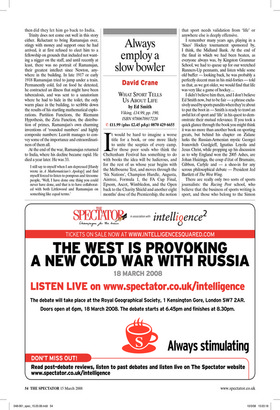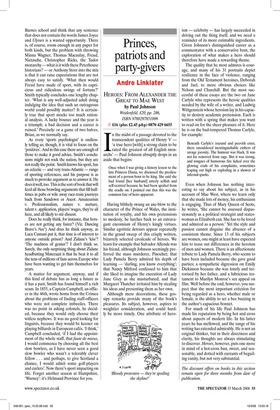Always employ a slow bowler
David Crane
WHAT sPORT TELLs Us ABOUT LIFE by Ed Smith Viking, £14.99, pp. 190, ISBN 9780670917228 ✆ £11.99 (plus £2.45 p&p) 0870 429 6655 It would be hard to imagine a worse title for a book, or one more likely to unite the sceptics of every camp. For those poor souls who think the Cheltenham Festival has something to do with books the idea will be ludicrous, and for the rest of us whose year begins with the Melbourne Test, and moves through the ‘Six Nations’, Champion Hurdle, Augusta, Aintree, Formula 1, the FA Cup Final, Epsom, Ascot, Wimbledon, and the Open back to the Charity Shield and another eight months’ dose of the Premiership, the notion that sport needs validation from ‘life’ or anywhere else is deeply offensive.
I remember many years ago, playing in a ‘Sixes’ Hockey tournament sponsored by, I think, the Midland Bank. At the end of the final in which we had been beaten, as everyone always was, by Kingston Grammar School, we had to queue up for our wretched Runners-Up pennants, and listen while some old buffer — looking back, he was probably a perfectly decent man in his mid-forties — told us that, as we got older, we would find that life was very like a game of hockey...
I didn’t believe him then, and I don’t believe Ed Smith now, but to be fair — a phrase exclusively used by sports pundits when they’re about to put the boot in — Smith is ready to trawl an awful lot of sport and ‘life’ in his quest to demonstrate their mutual relevance. If you took a quick glance through the book you might think it was no more than another book on sporting greats, but behind his chapter on Zidane lurks the Russian-Armenian mystic Georgei Ivanovitch Gurdgieff, Ignatius Loyola and Jesus Christ, while propping up his discussion as to why England won the 2005 Ashes, are Johan Huizinga, the coup d’état of Brumaire, Gibbon, Carlyle and — a shoo-in for any serous philosophical debate — President Jed Bartlett of The West Wing.
There are really only two sorts of sports journalists: the Racing Post school, who believe that the business of sports writing is sport, and those who belong to the Simon Barnes school and think that any sentence that does not contain the words James Joyce and Ulysses is a wasted opportunity. There is, of course, room enough in any paper for both kinds, but the problem with throwing Minna Wagner, Thomas Macaulay, Freud, Nietzsche, Christopher Ricks, the Tudor monarchy — what is it with these Peterhouse historians? — or Anthony Storr into the mix is that it can raise expectations that are not always easy to satisfy. ‘What then would Freud have made of sport, with its capricious and ridiculous swings of fortune?’ Smith typically concludes one lengthy chapter. ‘What is any well-adjusted adult doing indulging the idea that such an outrageous world could possibly matter? It is certainly true that sport mocks too much rational analysis. A lucky bounce and the year is a triumph; a bad decision and a career is ruined.’ Precisely: or a game of two halves, Brian, as we normally say.
As every ‘sports psychologist’ is endlessly telling us, though, it is vital to focus on the ‘positives’. And in this case there are enough of those to make it good advice. Smith’s conclusions might not rock the nation, but they are not really the point. Smith knows his sport, has an eclectic — and very trans-Atlantic — range of sporting references, and his purpose is as much to provoke argument as to answer it. He does it well, too. This is the sort of book that will feed all those brawling arguments that fill halftimes in pubs or wile away race-train journeys back from Sandown or Ascot. Amateurism v. Professionalism, nature v. nurture, talent v. application, players’ wages, they’re all here, and all likely to stir dissent.
Does he really think, for instance, that horses are not getting any faster? (Viz. Dancing Brave’s ‘Arc’) And does he think anyway, as Luca Cumani put it, that time is of interest to anyone outside prison? And Zidane’s ‘kiss’? ‘The madness of genius’? I don’t think so. Surely, the only surprising thing about Zidane headbutting Materazzi is that he beat it to all the tens of millions of fans across Europe who have been wanting to get him themselves for years.
A matter for argument, anyway, and if this kind of debate has as long a future as it has a past, Smith has found himself a rich seam. In 1855, a Captain Campbell, an officer in the 46th, wrote home from the Crimea about the problems of finding staff-officers who were not complete imbeciles. There was no point in asking colonels, he decided, because they would only choose their witless nephews. It was no good looking for linguists, because they would be keener on playing billiards in European cafés. ‘I think,’ Campbell concluded, ‘if I had the appointment of the whole staff, that faute de mieux, I would commence by choosing all the best slow bowlers, as I have never seen a good slow bowler who wasn’t a tolerably clever fellow . . . and perhaps, to give Scotland a chance, I would admit some golf-players and curlers’. Now there’s sport impacting on life. Forget another season at Hampshire, ‘Warney’: it’s Helmand Province for you.



























































































 Previous page
Previous page